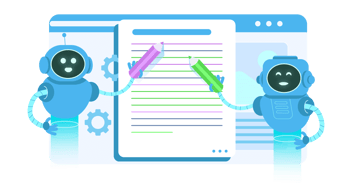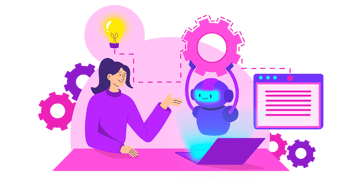Data-Driven Marketing with AI: How to Optimize Your Marketing Strategy
With the marketing world constantly evolving, data-driven marketing has emerged as a game-changer. However, with the increasing amount of data available, it can be challenging to sift through it all and make sense of it.
This is where AI comes in. Artificial intelligence technology, such as machine learning and natural language processing, can help marketers analyze large amounts of data quickly and accurately, leading to better decision-making and, ultimately, more successful marketing campaigns.

What is Data-Driven Marketing?
Data-driven marketing involves using data to inform and optimize marketing strategies, resulting in more targeted, effective campaigns that drive business growth. This approach involves collecting, analyzing, and using data to create a deep understanding of target customers and their behavior. By leveraging this understanding, marketers can create campaigns that resonate with their audience, increasing engagement and driving conversions.
There are several vital reasons why data-driven marketing matters. Firstly, it provides insights into customer behavior and preferences, which can be used to inform decisions on everything from product development to campaign messaging. This means that businesses can tailor their marketing efforts to their target audience's specific needs and interests, resulting in more efficient use of resources and higher ROI.
Secondly, data-driven marketing enables businesses to measure the effectiveness of their marketing campaigns. Marketers can determine what is working and needs improvement by tracking website traffic, social media engagement, and conversion rates. This allows for continuous optimization and improvement of campaigns, resulting in better results over time.
Thirdly, data-driven marketing helps businesses stay competitive in today's fast-paced digital landscape. By leveraging the latest technologies, such as artificial intelligence and machine learning, companies can gain a competitive edge by creating more effective and targeted campaigns than their competitors.
87% of marketers say data is their company's most under-utilized asset.
Finally, data-driven marketing is essential for creating a personalized customer experience. By understanding customer behavior and preferences, businesses can create tailored experiences more likely to resonate with their target audience. This leads to higher levels of engagement, loyalty, and repeat business.
But, as we've established, data-driven marketing relies heavily on collecting and analyzing large amounts of data. While this process can be time-consuming and complex, AI has the potential to make it more efficient and effective. AI-powered tools, such as machine learning and natural language processing, can help marketers extract insights from data sets that would be impossible to manage manually.
Data is at the core of data-driven marketing, and AI plays a crucial role in how marketers collect, analyze, and leverage that data.
Data-driven marketing with AI begins with collecting data from various sources, such as social media, email campaigns, website analytics, and customer relationship management (CRM) systems. Once this data is collected, AI-powered tools can be used to analyze it, uncover patterns and trends, and identify opportunities for optimization.
By incorporating AI into data-driven marketing strategies, businesses can achieve a level of accuracy and sophistication that was once unimaginable, giving them a powerful competitive advantage in today's market.
Understanding AI in Marketing
AI, or artificial intelligence, has been making waves in marketing in recent years. By leveraging the power of machine learning, natural language processing, and other cutting-edge technologies, AI has the potential to revolutionize the way we approach marketing. In this section, we will explore the basics of AI in marketing and what it means for businesses looking to optimize their marketing strategies.
At its core, AI refers to computer systems that can perform tasks that typically require human intelligence, such as visual perception, language understanding, decision-making, and more. In marketing, AI can analyze large amounts of data, predict customer behavior, personalize content, and automate various tasks. This makes AI a valuable tool for marketers looking to streamline their processes and improve the effectiveness of their campaigns.
Benefits of AI in Marketing
One of the most significant benefits of AI in marketing is its ability to analyze large amounts of data quickly and accurately. By feeding data into an AI system, marketers can gain insights into customer behavior, preferences, and trends, which can inform everything from campaign messaging to product development. This allows businesses to create more targeted and effective marketing campaigns, increasing ROI and customer engagement.
Businesses that use data-driven strategies drive five to eight times as much ROI as businesses that don’t.
Another way that AI can benefit marketers is through personalization. AI can analyze customer behavior and preferences using machine learning algorithms to create personalized content and experiences. This can include personalized product recommendations, targeted advertising, and customized email campaigns. This approach can lead to higher customer engagement, loyalty, and repeat business.
In addition to data analysis and personalization, AI can also be used to automate various marketing tasks. This includes lead scoring, social media scheduling, and email marketing automation. Marketers can save time and resources by automating these tasks while achieving the desired results. This allows businesses to focus on more strategic initiatives, such as developing new marketing campaigns or expanding their reach into new markets.
Challenges of AI in Marketing
Of course, like any technology, AI does have its limitations. One of the most significant challenges of using AI in marketing is ensuring that the data is accurate and relevant. This requires businesses to have strong data management practices in place, as well as effective quality control measures.
Another challenge of using AI in marketing is ensuring the algorithms are transparent and fair. With the potential for bias or discrimination in AI systems, businesses must be aware of these issues and take steps to mitigate them.
By leveraging the power of data analysis, personalization, and automation, businesses can create more targeted and effective marketing campaigns, resulting in higher ROI and increased customer engagement. However, to fully realize the benefits of AI in marketing, businesses must be mindful of its limitations and take steps to ensure that their data management and quality control practices are up to par.
Fortunately, the right AI platform can help businesses overcome these challenges and maximize the value of their AI tools and marketing efforts.
One platform that has been leading the way in AI-powered marketing is HubSpot. HubSpot's AI tools help marketers personalize content, automate workflows, and identify high-value leads, all while saving time and resources. By leveraging the power of AI in their marketing strategies, businesses can gain a competitive edge and drive growth like never before–but we'll get to that later.
HubSpot AI in Data-Driven Marketing
HubSpot is a leading provider of marketing automation and sales software, and its AI-powered tools can help businesses achieve better growth in their marketing and sales efforts.
1. Predictive Lead Scoring;
One of the key features of HubSpot AI is its ability to provide predictive lead scoring. The platform can use data about a prospect's behavior to predict their likelihood of becoming a customer. Using this data, businesses can focus their marketing efforts on the prospects most likely to convert and prioritize their sales efforts accordingly. This can help businesses to save time and resources by avoiding chasing leads that are unlikely to convert.
2. Content Strategy;
Another way that businesses can use HubSpot AI in their data-driven marketing strategies is by leveraging its content strategy tool. This tool uses AI to analyze a business's existing content and recommend new content based on topics likely to resonate with its target audience. By using this tool, companies can create content that is more likely to engage their target audience, leading to higher customer engagement and increased brand awareness.
3. Chatbot Builder;
HubSpot AI also offers a chatbot builder, which can help businesses to automate their customer service efforts. This tool uses AI to provide instant responses to customer inquiries and can be customized to provide personalized responses based on the customer's behavior and preferences. Using chatbots to automate customer service, businesses can provide faster and more efficient customer support, leading to higher customer satisfaction and loyalty.
4. Ad Targeting;
Another way that businesses can use HubSpot AI in their data-driven marketing strategies is by leveraging its ad targeting capabilities. HubSpot AI can analyze a business's customer data and use this information to create highly targeted advertising campaigns. By targeting their advertising efforts more effectively, companies can improve the ROI of their campaigns and drive greater revenue growth.
5. Analyze Website Performance;
Businesses can use HubSpot AI to analyze their website's performance and make data-driven decisions about improving it. HubSpot AI can provide insights into how visitors interact with a business's website, including which pages are most popular, how long visitors spend on each page, and where they drop off. Businesses can use this information to improve their website to create a more user-friendly experience that will likely engage their target audience.
6. Personalized Recommendations;
Another key feature of HubSpot AI is its ability to provide personalized recommendations for website visitors. By analyzing a visitor's behavior on a website, HubSpot AI can suggest related content or products that the visitor might be interested in. This can help businesses to increase engagement and conversions by offering a more personalized experience to their website visitors.
7. Email Marketing;
HubSpot AI also offers email marketing capabilities to help businesses create more effective and personalized email campaigns. The platform can analyze a business's customer data to create targeted email lists and provide insights into which types of content are most effective in driving engagement and conversions. Additionally, HubSpot AI can provide recommendations for optimizing email subject lines and content based on past performance data.
8. Social Media;
Another way that businesses can use HubSpot AI in their data-driven marketing strategies is by leveraging its social media capabilities. The platform can analyze a business's social media data to provide insights into which types of content are most effective in driving engagement and conversions. Additionally, HubSpot AI can help businesses identify influencers and advocates within their social media audience, which can be leveraged to drive further engagement and brand awareness.
9. Reporting and Analytics;
Finally, HubSpot AI offers a variety of reporting and analytics capabilities that can help businesses track their marketing performance and make data-driven decisions about future campaigns. The platform can provide insights into which channels and campaigns drive the most traffic, leads, and revenue and which types of content and messaging resonate with their target audience. Businesses can optimize their marketing strategies and drive more success by using these insights to make data-driven decisions.
HubSpot AI offers a variety of AI-powered tools and features that businesses can use to improve their data-driven marketing strategies. Organizations can use these tools to optimize their marketing campaigns, improve customer engagement, and drive revenue growth.
However, to be truly effective, businesses must clearly understand how to interpret and act on the insights gained from data analysis and the technical expertise required to implement and manage AI-powered tools and platforms. With the right tools, processes, and expertise, businesses can unlock the full potential of data-driven marketing with AI.
Getting Started with HubSpot AI
Now that we've explored the benefits of data-driven marketing with HubSpot AI, let's look at how businesses can get started with this powerful tool.
First things first, you need to create a HubSpot account. HubSpot offers a free CRM tool that can be used to store and manage your customer data. You can also use HubSpot's Marketing Hub and Sales Hub to create and execute marketing campaigns and strategies.
Once you have created a HubSpot account, you can begin integrating HubSpot AI into your marketing strategy. You can use HubSpot AI to analyze your customer data and gain insights into your audience's behavior, preferences, and pain points. This information can create personalized marketing campaigns that are more likely to resonate with your target audience.
HubSpot AI allows you to create custom workflows and campaigns tailored to your business needs. You can use HubSpot's drag-and-drop interface to create workflows that automate your marketing tasks, such as sending follow-up emails, assigning tasks to team members, and creating personalized lead nurturing campaigns.
Once you've got these preliminary steps, it's time to start applying HubSpot AI to your data-driven marketing strategy.
-
Set clear goals and KPIs: The first step to any successful marketing strategy is establishing clear goals and key performance indicators (KPIs). What is it that you want to achieve with your marketing efforts? Is it to increase website traffic, generate leads, or drive revenue growth? Once you've established your goals and KPIs, you can use HubSpot AI to track your progress and make data-driven decisions about optimizing your campaigns.
-
Collect and analyze your data: HubSpot AI relies on data to make accurate predictions and recommendations, so you must collect and analyze your data effectively. This includes gathering data from various sources, such as your website, social media accounts, email campaigns, and customer relationship management (CRM) system. Once you've collected your data, you can use HubSpot AI to analyze it and gain insights into your audience, their behavior, and preferences.
-
Build a comprehensive buyer persona: You must clearly understand your target audience to create effective marketing campaigns. This includes their demographics, behavior, interests, pain points, and purchasing habits. With HubSpot AI, you can use your data to create comprehensive buyer personas that accurately reflect your target audience. This will allow you to build more personalized and targeted marketing campaigns that are more likely to resonate with your audience.
-
Optimize your content strategy: Content is the backbone of any successful marketing campaign, and HubSpot AI can help you optimize your content. By analyzing your content and your audience's behavior, HubSpot AI can provide recommendations for the types of content that are most likely to engage your audience and drive conversions. This includes insights into the best topics, formats, channels for your content and recommendations for optimizing your headlines, keywords, and other on-page elements.
-
Use chatbots and AI-powered messaging: Chatbots and AI-powered messaging can be powerful tools for engaging with your audience and providing personalized customer experiences. With HubSpot AI, you can implement an AI Chatbot to automate customer interactions, provide personalized recommendations, and drive conversions. This can help you to scale your customer service efforts and provide a more seamless experience for your audience.
-
Leverage social media and paid advertising: Social media and paid advertising can be a powerful way to reach your target audience and drive conversions. With HubSpot AI, you can analyze your social media data to gain insights into your audience and identify influencers and advocates. You can also use the platform to create targeted advertising campaigns that are more likely to reach your ideal audience and drive conversions.
-
Monitor and analyze your results: Finally, you must monitor and analyze your marketing results regularly. With HubSpot AI, you can track your progress against your goals and KPIs and make data-driven decisions about optimizing your campaigns. This includes analyzing your website performance, social media engagement, email open rates, click-through rates, and conversion rates. Monitoring and analyzing your results can improve your marketing strategy and drive greater success.
Overall, data-driven marketing with HubSpot AI can be a powerful tool for driving revenue growth and providing personalized customer experiences. By setting clear goals and KPIs, collecting and analyzing your data, building a comprehensive buyer persona, optimizing your content strategy, using chatbots and AI-powered messaging, leveraging social media and paid advertising, and monitoring and analyzing your results, you can create more effective and personalized marketing campaigns that are more likely to engage your target audience and drive conversions.
That said, while HubSpot AI can be a powerful tool for optimizing your marketing strategy, it's important to remember that it's only one piece of the puzzle. You should also rely on your experience and intuition to make informed decisions about your marketing campaigns.
Revolutionize Your Data-Driven Marketing Strategy with HubSpot AI
In conclusion, data-driven marketing with AI is rapidly transforming the marketing landscape. By leveraging the power of AI and machine learning, businesses can gain valuable insights into their customers' behavior, preferences, and pain points. With these insights, they can create personalized and effective marketing campaigns that drive engagement and conversions.
HubSpot AI is one such tool that enables organizations to harness AI in business marketing strategies. By automating routine tasks, analyzing customer data, and providing valuable insights, HubSpot AI helps organizations optimize their marketing campaigns and achieve their goals.
Whether you're just starting with data-driven marketing or are looking to take your strategy to the next level, HubSpot AI offers a wide range of features and tools to help you succeed. HubSpot AI provides everything you need to create effective and personalized marketing campaigns, from lead nurturing and scoring to custom workflows and campaigns.
So, what are you waiting for? With HubSpot AI, you can take your marketing strategy to the next level and achieve your goals faster and more efficiently. Don't just take our word for it; try HubSpot AI and see your results!
As the famous marketer David Ogilvy once said, "Don't bunt. Aim out of the ballpark. Aim for the company of immortals." By embracing data-driven marketing with AI and leveraging tools like HubSpot AI, you can aim for that company of immortals and take your business to new heights of success.
This content is also available in:
- Deutsch: Datengesteuertes KI-Marketing: Optimieren Sie Ihre Marketingstrategie
- Español: Data-Driven con IA: cómo optimizar su estrategia de marketing
- Français: Le marketing avec l'IA : comment optimiser votre stratégie
- Italiano: Data-driven Marketing con AI: si ottimizza la strategia di marketing
- Română: Marketing bazat pe date cu AI: optimizează strategia ta!
- 简体中文: 人工智能数据驱动营销:如何优化营销策略











Leave a Comment